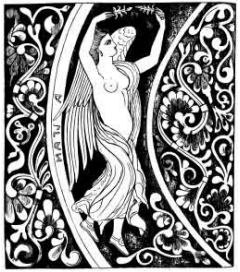Albina (mythology) on:
[Wikipedia]
[Google]
[Amazon]
Albina or The White Goddess is a goddess (possibly Etruscan) associated with the dawn and the founding of 
Great Britain
Great Britain is an island in the North Atlantic Ocean off the northwest coast of continental Europe. With an area of , it is the largest of the British Isles, the largest European island and the ninth-largest island in the world. It is ...
.

''"The White Goddess"''
Robert Graves
Captain Robert von Ranke Graves (24 July 1895 – 7 December 1985) was a British poet, historical novelist and critic. His father was Alfred Perceval Graves, a celebrated Irish poet and figure in the Gaelic revival; they were both Celti ...
' essay ''" The White Goddess"'' describes Albina as of one of fifty sisters (see Danaïdes) who named Albion. It is thought that the original name for Great Britain, Albion, was inspired by the White Cliffs of Dover, derived from the Latin albus, meaning "white" or "bright".
''"Etruscan Roman Remains in Popular Tradition"''
Albina is mentioned inCharles Godfrey Leland
Charles Godfrey Leland (August 15, 1824 – March 20, 1903) was an American humorist and folklorist, born in Philadelphia, Pennsylvania. He was educated at Princeton University and in Europe.
Leland worked in journalism, travelled extensive ...
's 1892 collection of folklore "''Etruscan Roman Remains in Popular Tradition"''. According to Leland, Albina was an Etruscan goddess of light and ill-fated lovers. The accounts of Albina were obtained by word of mouth from local and often illiterate peasants, some of whom were considered witches
Witchcraft traditionally means the use of magic or supernatural powers to harm others. A practitioner is a witch. In medieval and early modern Europe, where the term originated, accused witches were usually women who were believed to have use ...
or ''"Strega"''. Possibly a combination of other deities such as Alpanu and Aurora, Albina is described as a beautiful flying woman (or fairy) and associated with light. The Albina referenced by Leland is likely only loosely related to the figure described in The White Goddess.
References
* * *External links
* * * Etruscan goddesses Love and lust goddesses Solar goddesses Dawn goddesses {{deity-stub